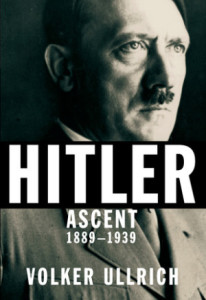
 Godwin’s Law is the tongue-in-cheek observation that in online arguments, the longer the discussion continues the probability of a comparison to Nazis or Hitler approaches certainty. It’s a subtle poke at the idea that people resort to Hitler comparisons as insults when the logic of their arguments is failing. Of course there’s some truth behind Godwin’s Law; comparing a low-level political hack to Hitler or some ham-handed social policy to Nazism is rarely valid. But that’s where the humor of Godwin’s Law fails… sometimes the comparison is valid, and then there’s nothing to smile about.
Godwin’s Law is the tongue-in-cheek observation that in online arguments, the longer the discussion continues the probability of a comparison to Nazis or Hitler approaches certainty. It’s a subtle poke at the idea that people resort to Hitler comparisons as insults when the logic of their arguments is failing. Of course there’s some truth behind Godwin’s Law; comparing a low-level political hack to Hitler or some ham-handed social policy to Nazism is rarely valid. But that’s where the humor of Godwin’s Law fails… sometimes the comparison is valid, and then there’s nothing to smile about.
We study the political cancers of people like Hitler, Mao, and Stalin so we learn how they were able to perpetrate their evil and how we can prevent it. The more political figures at home or abroad mimic the tone and tactics of Nazis the more we worry about them and with very good reason. Much of America is standing agape at the rise of Donald Trump, not just because he’s a boor, not just because he’s incoherent and rude, not just because he’s arrogant and shallow. They boggle at his demagoguery, his demonization of minorities, his use of thugs, and his mastery of propaganda. When they wonder how their friends and family can support this man, they’re struggling with the same questions that faced the people of Germany of the 30’s. They see real echoes of history with real lessons for us today.
Are they right? That’s the question and that’s why we picked “Hitler” for the Spotlight this month. What actually brought it to our attention was a review in the New York Times (below) by Michiko Kakutani. He goes into great detail about the near-inconceivable rise of a “half-insane rascal,” a “pathetic dunderhead,” a “nowhere fool,” and a “big mouth” to almost ruling the world, and the scary parallels to Donald Trump are glaringly obvious but completely unstated. Kakutani does not say Mr. Trump’s name once. Maybe this is a corollary to Godwin’s law… if you lay out the facts and let your opponent see Hitler by themselves, you’ve won.
Click the book title to go to the Powells.com site for the book, click the review links to read the full review.
 Hitler- Ascent, 1889-1939
Hitler- Ascent, 1889-1939
by Volker Ullrich
New York Times book review (below) by Michiko Kakutani
How did Adolf Hitler — described by one eminent magazine editor in 1930 as a “half-insane rascal,” a “pathetic dunderhead,” a “nowhere fool,” a “big mouth” — rise to power in the land of Goethe and Beethoven? What persuaded millions of ordinary Germans to embrace him and his doctrine of hatred? How did this “most unlikely pretender to high state office” achieve absolute power in a once democratic country and set it on a course of monstrous horror?
A host of earlier biographers (most notably Alan Bullock, Joachim Fest and Ian Kershaw) have advanced theories about Hitler’s rise, and the dynamic between the man and his times. Some have focused on the social and political conditions in post-World War I Germany, which Hitler expertly exploited — bitterness over the harsh terms of the Treaty of Versailles and a yearning for a return to German greatness; unemployment and economic distress amid the worldwide Depression of the early 1930s; and longstanding ethnic prejudices and fears of “foreignization.”
Other writers — including the dictator’s latest biographer, the historian Volker Ullrich — have focused on Hitler as a politician who rose to power through demagoguery, showmanship and nativist appeals to the masses. In “Hitler: Ascent, 1889-1939,” Mr. Ullrich sets out to strip away the mythology that Hitler created around himself in “Mein Kampf,” and he also tries to look at this “mysterious, calamitous figure” not as a monster or madman, but as a human being with “undeniable talents and obviously deep-seated psychological complexes.”
“In a sense,” he says in an introduction, “Hitler will be ‘normalized’ — although this will not make him seem more ‘normal.’ If anything, he will emerge as even more horrific.”










